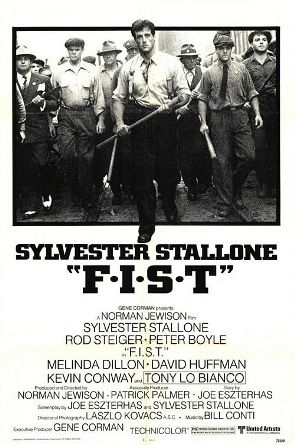
In 1978, Sylvester Stallone was cast to portray a labor leader with a story remarkably similar to that of the late James R. Hoffa. The film was F.I.S.T., a clever acronym representing the fictional Federation of Interstate Truckers union.
F.I.S.T. was filmed in Dubuque, Iowa, providing the dated industrial backdrop the film makers were striving for. Some folks in Dubuque still have the movie prop union membership pins from the film, which sport the creative logo of a hand clutching a contract, and the distinctive F.I.S.T. lettering.
As the film opens we find Stallone, working on a loading dock where backbreaking labor earns low pay, and even less respect, as a tyrannical foreman hounds his every step. It is in this environment that the Stallone character will hone his skills at organizing, and take his place in the labor movement.
The willingness of companies to use violence against striking workers and union organizers is graphically portrayed, and it is in this life and death struggle that the Stallone character reaches out to engage a local criminal syndicate as allies in his ongoing war against the ruthless company operators.
Unfortunately, while the Stallone character is tenacious, one might even say unstoppable, in his pursuit of an advantageous contract for his members, he has no ideological underpinnings to guide him, nor a strategic political plan to advance the overall cause of the working class.
F.I.S.T. has some memorable cinematic moments. One of the best is when Stallone leads strikebreaking goons into a trap. As the company muscle approaches the pickets with the intention of busting heads, they are surprised to hear the rhythmic sounds of axe handles and split mauls being pounded against the pavement. The startled toughs turn around to realize they are now surrounded.
Another powerful scene has Stallone at a podium, exhorting the crowd to demonstrate the might of their numbers and their unity by acting as “one fist!” prompting the membership to fill the hall with the deafening roar of the repeated cry, “One fist! One fist! One fist!”
The film provides several other outstanding actors with a platform that makes for memorable characters.
Peter Boyle is good as a brash and unimaginative union president who intones members to get their dues in on time and to be wary of communist agitators, an admonition that produces puzzled looks and a collective groan from those assembled.
Rod Steiger makes your skin crawl as a stuffed shirt U.S. senator who poses as a reformer but gets called out by Stallone as a weasel who knows nothing about the working man when they spar at a contentious Senate hearing.
F.I.S.T. is by no means a perfect representation of the working class or the struggle of organized labor. It lacks depth, but it is credible in several respects, and certainly provides solid entertainment. Its biggest downfall is a poorly edited and ill-conceived conclusion.
In the end the film becomes a fairly typical rise and fall drama devoid of any real message, but the first hour in particular, which includes a nice, if all too brief example of black-white worker unity on the job, is something the working-class activist can very much relate to, and can be appreciated as we all find ourselves in similar struggles once again.
Photo: Wikipedia (CC)












Comments